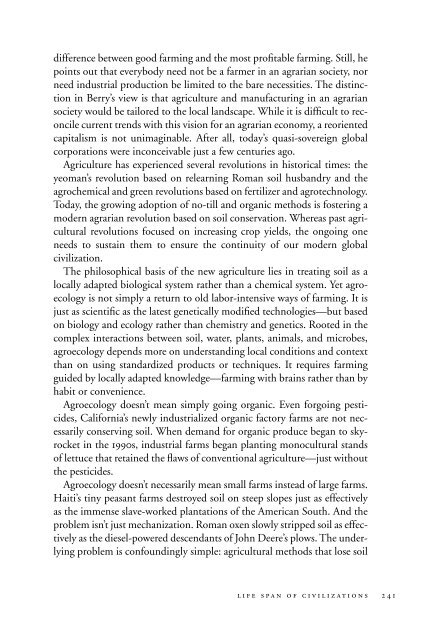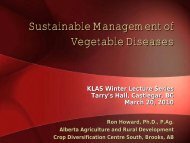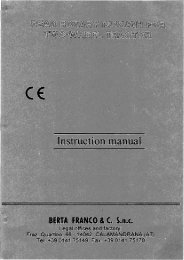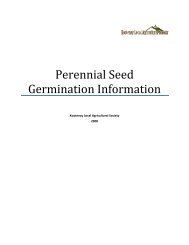Dirt: The Erosion of Civilizations - Kootenay Local Agricultural Society
Dirt: The Erosion of Civilizations - Kootenay Local Agricultural Society
Dirt: The Erosion of Civilizations - Kootenay Local Agricultural Society
Create successful ePaper yourself
Turn your PDF publications into a flip-book with our unique Google optimized e-Paper software.
difference between good farming and the most pr<strong>of</strong>itable farming. Still, he<br />
points out that everybody need not be a farmer in an agrarian society, nor<br />
need industrial production be limited to the bare necessities. <strong>The</strong> distinction<br />
in Berry’s view is that agriculture and manufacturing in an agrarian<br />
society would be tailored to the local landscape. While it is difficult to reconcile<br />
current trends with this vision for an agrarian economy, a reoriented<br />
capitalism is not unimaginable. After all, today’s quasi-sovereign global<br />
corporations were inconceivable just a few centuries ago.<br />
Agriculture has experienced several revolutions in historical times: the<br />
yeoman’s revolution based on relearning Roman soil husbandry and the<br />
agrochemical and green revolutions based on fertilizer and agrotechnology.<br />
Today, the growing adoption <strong>of</strong> no-till and organic methods is fostering a<br />
modern agrarian revolution based on soil conservation. Whereas past agricultural<br />
revolutions focused on increasing crop yields, the ongoing one<br />
needs to sustain them to ensure the continuity <strong>of</strong> our modern global<br />
civilization.<br />
<strong>The</strong> philosophical basis <strong>of</strong> the new agriculture lies in treating soil as a<br />
locally adapted biological system rather than a chemical system. Yet agroecology<br />
is not simply a return to old labor-intensive ways <strong>of</strong> farming. It is<br />
just as scientific as the latest genetically modified technologies—but based<br />
on biology and ecology rather than chemistry and genetics. Rooted in the<br />
complex interactions between soil, water, plants, animals, and microbes,<br />
agroecology depends more on understanding local conditions and context<br />
than on using standardized products or techniques. It requires farming<br />
guided by locally adapted knowledge—farming with brains rather than by<br />
habit or convenience.<br />
Agroecology doesn’t mean simply going organic. Even forgoing pesticides,<br />
California’s newly industrialized organic factory farms are not necessarily<br />
conserving soil. When demand for organic produce began to skyrocket<br />
in the 1990s, industrial farms began planting monocultural stands<br />
<strong>of</strong> lettuce that retained the flaws <strong>of</strong> conventional agriculture—just without<br />
the pesticides.<br />
Agroecology doesn’t necessarily mean small farms instead <strong>of</strong> large farms.<br />
Haiti’s tiny peasant farms destroyed soil on steep slopes just as effectively<br />
as the immense slave-worked plantations <strong>of</strong> the American South. And the<br />
problem isn’t just mechanization. Roman oxen slowly stripped soil as effectively<br />
as the diesel-powered descendants <strong>of</strong> John Deere’s plows. <strong>The</strong> underlying<br />
problem is confoundingly simple: agricultural methods that lose soil<br />
life span <strong>of</strong> civilizations 241






